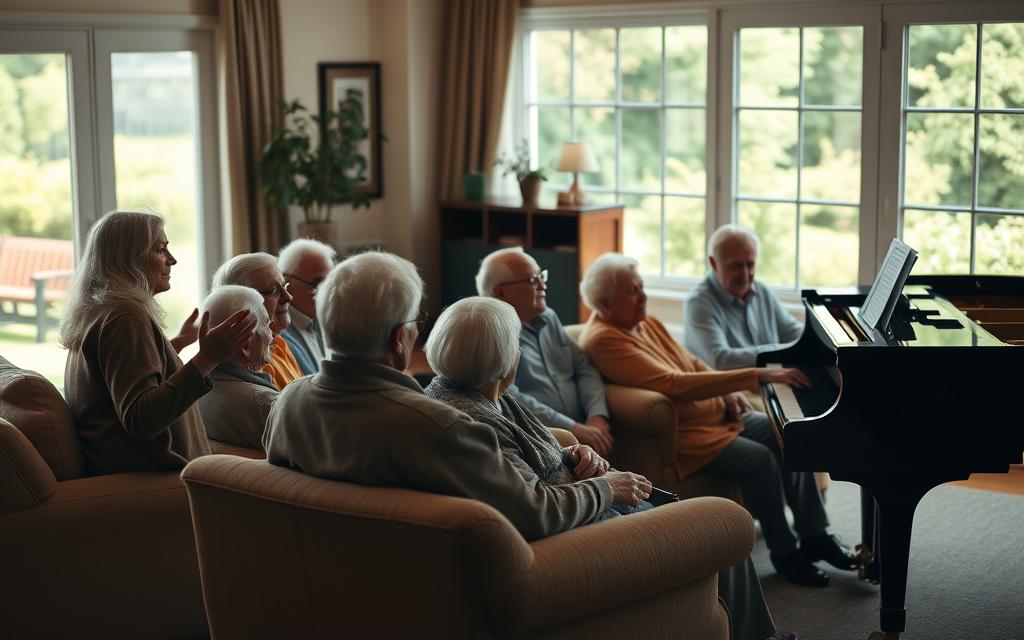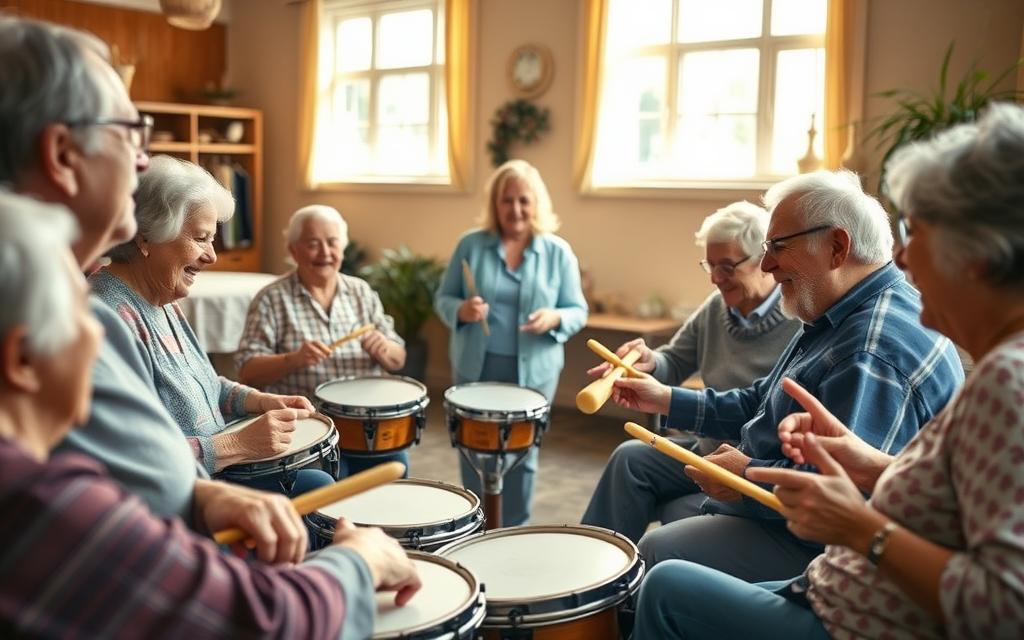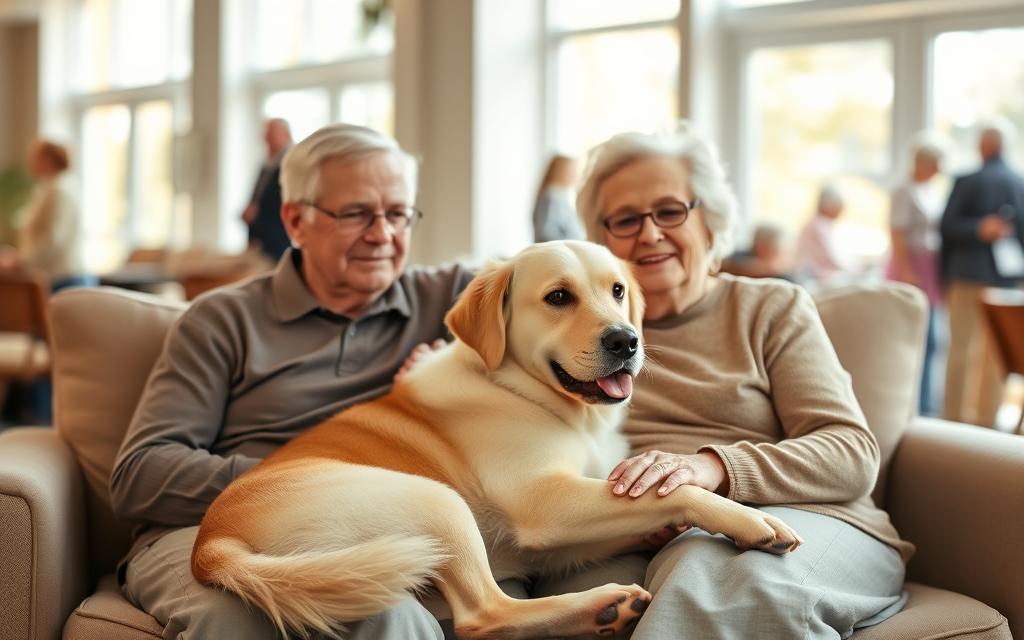Music Therapy Activities for Seniors Guide
As we get older, our lives are filled with memories and emotions. Have you ever noticed how a song can take you back to a special moment? This shows the power of music. It can really help seniors feel better and live better lives.
Studies show that therapeutic music for elderly people is very helpful. It can make them feel less stressed and happier. It can even help their brains work better. But how does music therapy work, and how can it help seniors?
Key Takeaways
- Music therapy can make seniors feel much better.
- Therapeutic music is great for elderly people with Alzheimer’s or dementia.
- Senior music programs can be made just for older adults.
- Music therapy can make seniors feel less stressed and happier.
- It can also help their brains work better.
What is Music Therapy for Seniors?
Music therapy is amazing for seniors. It uses music to help with physical, emotional, and mental health. It also helps with social and movement needs.
Understanding the Basics of Music Therapy
Music therapy includes singing therapy for dementia patients, drumming circles for older adults, and musical reminiscence therapy. These activities help with memory, reduce stress, and improve health. Seniors feel comfort and relaxation, which is great for those with dementia.
How Music Therapy Benefits Seniors
Music therapy is very good for seniors. It brings back memories, fights loneliness, and builds community. Drumming circles and other activities also improve physical health.
It gives seniors a way to express themselves. This helps them talk better and connect with others. Music therapy is a great way to care for seniors’ health and happiness.
Engaging Music Therapy Activities for Seniors
Seniors can really benefit from music therapy. It’s fun, interactive, and makes them feel good. It’s not just for fun; it also helps their health.
Group Singing and Chanting
Group singing and chanting help seniors feel connected. When they sing together, they feel happier and less lonely. It also helps their brains stay sharp.
You can have singing sessions where they sing their favorite songs. This helps them connect and express their feelings.
Listening Sessions for Relaxation
Listening to music can help seniors relax. You can play calming music to help them unwind and feel less stressed. You can pick music they love, which helps them feel better.
This is great for seniors who feel anxious or sad.
Rhythm and Movement Activities
Music and movement are good for seniors. They can clap, tap, or dance to music. It’s fun and helps them stay active.
| Activity | Benefits | Tips for Implementation |
|---|---|---|
| Group Singing | Improves mood, reduces loneliness, enhances cognitive function | Organize regular sessions, choose familiar songs |
| Listening Sessions | Reduces stress, promotes relaxation | Create a calming atmosphere, tailor music to individual preferences |
| Rhythm and Movement | Improves physical well-being, coordination, and mobility | Encourage clapping, tapping, or dancing; adapt to mobility levels |
Adding these music therapy activities to daily life can make a big difference. It helps seniors feel better emotionally, mentally, and physically.
The Therapeutic Benefits of Music
Music therapy is great for seniors. It helps with many health areas. This includes brain function and feeling good.
Enhancing Memory and Cognition
Music therapy boosts memory and brain power in seniors. Studies show it makes the brain work better. Singing songs can help those with dementia remember.
Reducing Anxiety and Depression
Music calms seniors, easing anxiety and sadness. Its soothing sounds create a peaceful space. This helps with mental health issues.
Promoting Physical Well-Being
Music and movement help seniors stay active. It improves skills like balance and coordination. This is good for those who move less.
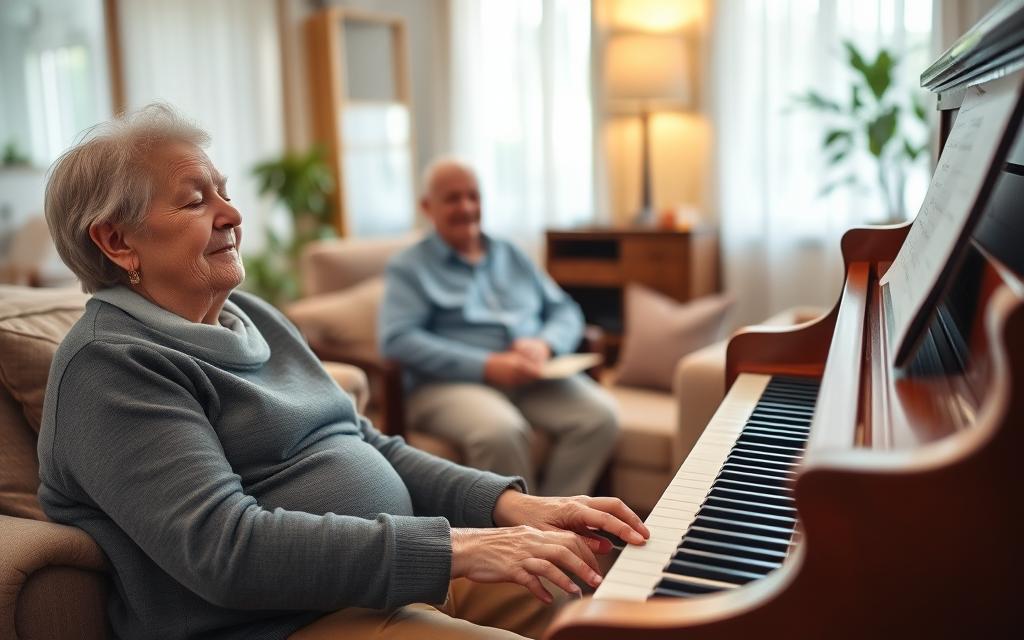
| Benefit | Music Therapy | Traditional Therapy |
|---|---|---|
| Memory Enhancement | Stimulates brain activity, improving recall | May not be as effective for some seniors |
| Anxiety Reduction | Creates a calming atmosphere, reducing anxiety | Can be effective but may have limitations |
| Physical Well-being | Improves motor skills and coordination through movement | May not be as engaging or interactive |
Music therapy is a full health plan for seniors. It makes them feel better in many ways.
Adapting Music Activities for Different Needs
Changing music therapy to fit each person’s needs can really help. When looking into music therapy for seniors, it’s key to know how to adjust these activities. This makes them more helpful for everyone.
Tailoring Activities for Alzheimer’s and Dementia
For those with Alzheimer’s and dementia, singing therapy is very helpful. Studies show that songs they know can bring back memories and feelings. This can make them feel better and more awake.
A study found that music therapy made dementia patients happier and smarter. Here are the results:
| Therapy Type | Improvement in Mood | Cognitive Function |
|---|---|---|
| Singing Therapy | 85% | 60% |
| Listening Sessions | 70% | 55% |
Accommodating Seniors with Mobility Issues
Seniors who can’t move around much can also enjoy music therapy. Senior music engagement programs can be made easy for them. For example, music therapists can use instruments that are easy to reach or do activities that don’t hurt their bodies.
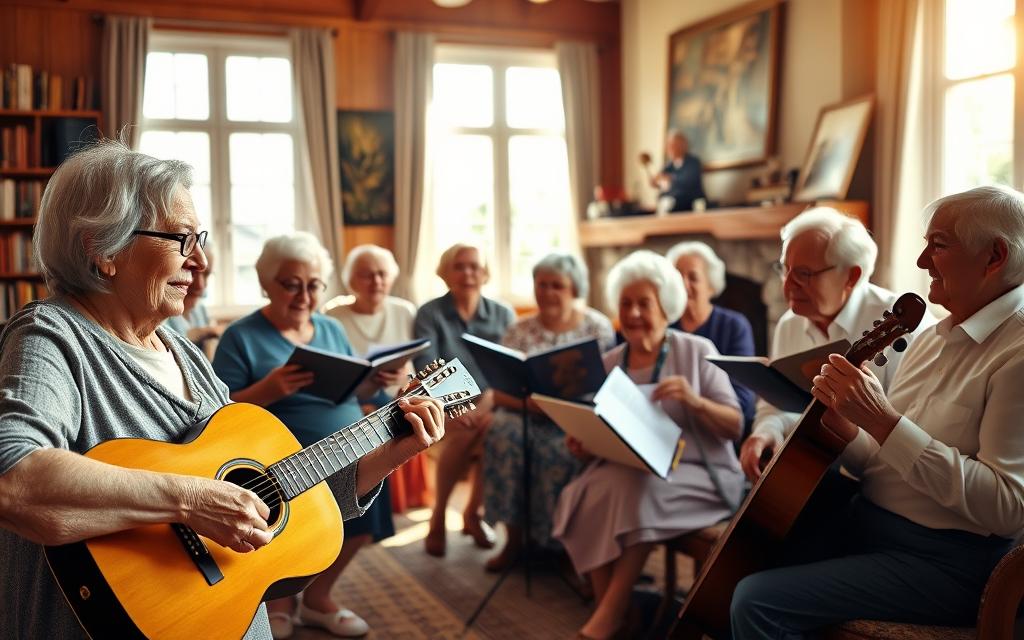
By making music therapy fit different needs, we can make a place where everyone feels welcome. Music therapy can help seniors in many ways. It can make their lives better through singing, listening, or moving.
Combining Music Therapy with Other Therapies
Exploring different therapies can lead to a great solution. Mixing music therapy with other therapies can really help seniors. It makes them feel better overall.
Adding music therapy to your health plan is smart. It works well with art therapy to boost creativity. This mix helps seniors in many ways.
Integrative Approaches to Health Care
Music therapy with other therapies makes a better health plan. You get many benefits, like better mental and physical health. Here are some ways to mix therapies:
- Music therapy with physical therapy helps move better and stay balanced.
- Music therapy in cognitive therapy helps with mental health.
- Music and art therapy together boosts creativity and self-expression.
Benefits include feeling better overall, improved mental health, and better physical health. A mix of treatments helps with many health issues at once.
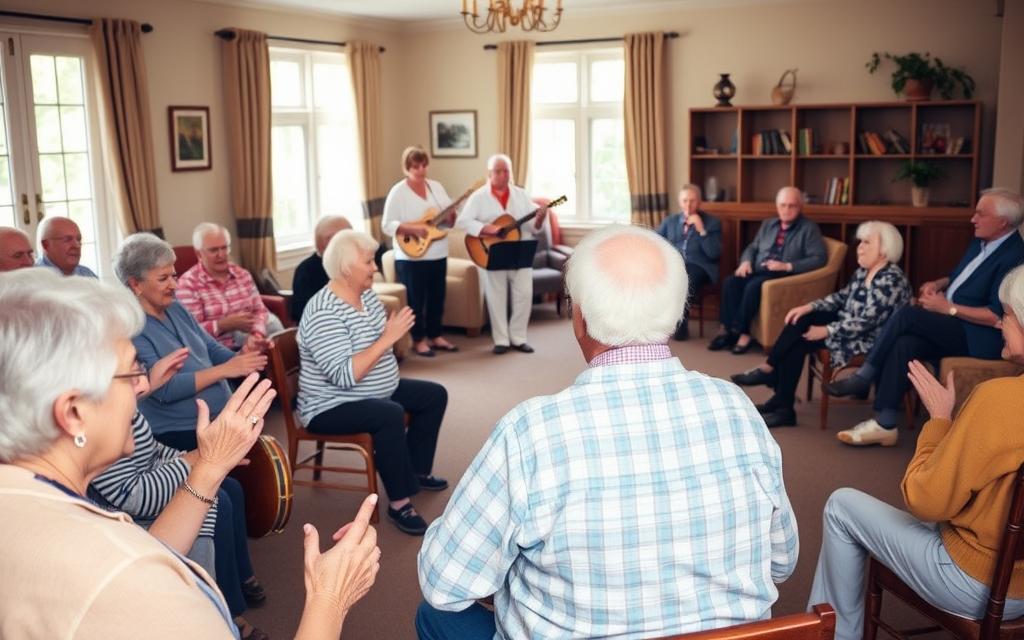
Collaborative Techniques in Wellness Programs
Wellness programs use teamwork to make a plan just for you. You work with music, art, and physical therapists. This team approach makes sure your plan fits you perfectly.
| Therapy Combination | Benefits |
|---|---|
| Music Therapy + Art Therapy | Enhanced creativity, improved self-expression |
| Music Therapy + Physical Therapy | Improved mobility, better coordination |
| Music Therapy + Cognitive Behavioral Therapy | Improved mental health, reduced anxiety and depression |
By mixing music therapy with other therapies and using teamwork, you can feel much better. It’s a big step towards better health.
Tools and Instruments for Music Therapy
Using the right tools in music therapy can really help seniors feel better. Music therapy can be more fun with different instruments and tech.
Simple Instruments You Can Use
Tambourines and maracas are great for seniors. They are easy to play and help with memory and movement.
Handbells and drums are also good. They make music-making fun for seniors, bringing joy and a sense of achievement.
Technology in Music Therapy Sessions
Technology is key in music therapy, bringing new ways to engage seniors. Digital music players offer a wide range of music, pleasing all tastes.
Music therapy apps are also useful. They help make music playlists, aid in singing, and offer cognitive training.
By mixing simple instruments with tech, music therapy can be customized for seniors. This makes the experience better and more enjoyable.
Creating a Music-Friendly Environment
To make music therapy work best, we need a cozy and welcoming space. A good environment can really help with rhythm activities for aged care. It makes seniors feel better and more at ease.
Designing Cozy and Inviting Spaces
When making a music therapy room, think about comfort and easy access. Make sure the room is bright and has comfy seats. It should also have few things to distract you.
Use soft lights, cozy chairs, and calm colors to make it warm. This helps seniors relax and enjoy memory-enhancing music sessions more.
Tips for Encouraging Participation
Getting seniors to join in is key for music therapy to succeed. Start by making a place where they feel safe to share. Play different kinds of music to match their likes.
Adding pictures or words to the music can make it even better. This makes the experience more fun and helpful.
Involve seniors in picking the music. Ask them what kind they like. This makes them feel like they’re part of it. It makes the experience more fun and rewarding.
Involving Family and Community
You can make music therapy better by getting your family and community involved. Senior music engagement programs help seniors feel better when they have support. This support comes from those around them.
Music is special because it brings people together. When seniors share music with their family, it makes their bond stronger. It creates a feeling of connection and community.
Encouraging Family Engagement in Music Therapy
When family members join in music therapy, it makes a big difference. It gives seniors emotional support and helps family members see the value of music therapy. It becomes a special experience they share.
Invite family to join in musical reminiscence therapy sessions. This can spark conversations and bring up shared memories. It makes the therapy even more effective.
Building a Supportive Community Network
Building a community around music therapy is very helpful. You can do this by having regular music therapy events, workshops, or support groups. These should include both seniors and their families.
This community network keeps seniors motivated and engaged. It also helps them share tips and advice on music therapy. This makes it more effective for everyone.
Think about working with local groups or community centers for these events. This way, more people can join in. It helps everyone feel like they belong.
Getting your family and community involved in music therapy creates a strong support system. This approach makes music therapy a key part of seniors’ lives. It brings lasting benefits to their care and well-being.
Encouragement and Support Resources for Caregivers
As a caregiver, adding music therapy for seniors to daily routines is rewarding. You can find many resources to help you use music therapy better. These resources support the seniors you care for.
Valuable Resources for Enhancing Music Therapy
Look online for tips on using drumming circles for older adults and other music therapy. These resources help you make music therapy fit the needs of seniors.
Insights from Online Platforms and Communities
Join online groups and forums about music therapy. Here, you can meet other caregivers and experts. They share tips, best practices, and support to help you with caregiving.
Using these resources and joining online groups helps you grow. You can keep improving your skills in using music therapy to help seniors.
Resources:
